April 4, 2018 at 5:30 p.m.
Bud Herron: Scars remained from East Hope childhood
My father quit school two months before he was to graduate.
He had been accused by J. Ray Ross (then the young principal at Hope and later to be in the same position at Columbus High School) of stealing the light switch knobs in the school's study hall.
The way Dad told the story, another boy had removed the knobs as a prank, but Mr. Ross decided Dad had stolen them. When Dad would neither confess nor reveal the name of the other boy, the principal picked up his heavy wooden paddle and told Dad to "grab his ankles."
In response, Dad picked up the folding chair he had been sitting on and told Mr. Ross he would not be paddled for something he didn't do.
Mr. Ross told him that if he didn't put the chair down he would be expelled. Dad told Mr. Ross he couldn't expel him because he had just quit school.
It would be several years until Dad received a high school diploma -- finishing the requirements in night school. Yet, even after earning the diploma, the incident was something he carried with him his entire life.
To him, the unfair treatment by Principal Ross was more than just a misunderstanding that got out of hand; it was a part of a pattern of treatment he felt was wielded against "the poor kids" in Hope by the school and others "in power."
That view seemed odd -- even silly -- during my school years in the 1950s and 1960s. If anything, I saw myself and my family as privileged. Dad's view from his school years in the 1920s and 1930s was something else.
He always spoke of growing up in "East Hope," for instance. To him, there were two Hopes.
The people living west of Elm Street (the farther west the better) had money, owned the businesses and ran the town. These were mainly Moravians, who had founded the town and were in charge.
The people living where he lived, along and east of Elm Street, were poor and had no power in the town. They were mainly of Scotch/Irish heritage, had little education and did the town's "grunt work."
He remembered an ongoing fight between the kids in the two halves of Hope. He told stories about how the East Hope kids would chase the Hope kids back across Elm Street, and vice versa, whenever one side invaded the other's territory.
He talked about the slights he felt at school and how the teachers were tough on the kids from East Hope and always favored the Hope kids.
Bitterly, he told of being vaccinated with a new smallpox vaccine at school when he was in the first grade. He claimed permission forms were sent to the parents of "Hope kids" before the new drug was administered. The "East Hope" parents, he said, received no permission slips.
"We were the guinea pigs," he used to say. "If it didn't kill us, they could give it to the important children."
All of us see the world through our own unique set of eyes and no memory is left untainted by where we have been or where we stand when we look back. So, the history is a picture severely blurred by the fog we look through.
Still, some emotional truth resides in every memory about those long-ago times and about ourselves.
If J. Ray Ross could speak today, he undoubtedly would remember the great "light knob confrontation" differently. Anyone left from the "Moravian majority" from the 1920s, probably would not see himself as a prejudiced elite.
In his adult years, Dad certainly was not a part of any outcast tribe of East Hope rabble. He was a respected part of the community with many close friends on both sides of Elm Street.
Yet, he still felt those childhood scars -- whether they were real or just reality viewed through the foggy emotions of a once-small boy.
We all carry our share of scars. I guess the important thing ultimately is not the scars, but how we use them to improve ourselves and the world around us.
In our family, Dad's stories became family parables rather than bitter folk tales. For my generation they were stories that taught lessons about prejudice, compassion, pride and determination.
His scars became my blessings.
